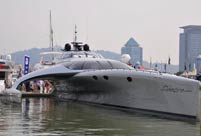The Syrian crisis and its repercussions demonstrate that politicians and analysts cannot ignore the Mediterranean if they really want to face global challenges.
After the Egyptian military coup against former president Mohamed Morsi, the media consensus on Syria has shifted, with people becoming more aware of the dangerous role of Islamic extremism among elements of the Syrian rebel movement.
And the consensus was strongly against Western involvement in any renewed war.
Although there is some ambiguity, the Italian and German governments remain opposed to any military intervention in Syria without UN Security Council approval.
Even if Rome and Berlin have never seriously questioned their Atlanticist-oriented policies, they cannot afford to intervene in Syria through military means.
After the approval of EU sanctions against the Syrian government, Italian trade balance is down about $2 billion.
If the US and France intervened, Italian commercial losses would increase, and collective security would be significantly compromised.
German Chancellor Angela Merkel has also expressed her fears of a military escalation in the Middle East.
Ten years after the US invasion of Iraq, a new political consciousness seems to be increasing in the region that the US, France and the UK should not decide by themselves to attack a sovereign country.
Southern European countries like Italy, Spain and Greece are experiencing a hard economic crisis, and currently they still lack the means or credibility to discuss a common Mediterranean policy aimed at the stabilization of the region.
Nevertheless, Washington, Paris and London cannot adequately understand and represent the interests of the Mediterranean peoples.
To Southern European critics, these three world powers are just readapting the old colonial Sykes-Picot plan to current times and establishing new spheres of influence without any regard for local populations, their rights and their sovereignty. Syrian territory seems to represent the pivot of this new Middle Eastern great game.
Since the beginning of the Syrian crisis, the southern Mediterranean has become a geopolitical hell.
The violent uprisings left thousands of people dead. The economies of many Middle Eastern states have been shaken. And Islamist terrorism has spread fear and violence not only in Muslim countries but also in Europe, not only against peaceful Muslims but also against Christians.
One year ago, then US secretary of state Hillary Clinton said that the Pacific would be the most important maritime theater of the 21st century. This is true but only in part because the latest escalation in Syria shows also the huge importance of the Mediterranean.
"What is the Mediterranean?" French historian Ferdinand Braudel wondered many years ago in his classic history of the region, answering that "It is a thousand things together. Not just a landscape but innumerable landscapes. Not a sea but a succession of seas. Not one civilization but a series of civilizations stacked on each other. For thousands of years everything has flowed toward this sea, upturning and enriching its history."
The future of this region must be built through development, inter-religious dialogue and mutual comprehension, not through imperialism and fanaticism.
The author is a journalist and foreign affairs analyst based in Perugia, Italy. opinion@globaltimes.com.cn
 2013 Colour Me Rad 5K run held in Canada
2013 Colour Me Rad 5K run held in Canada China's destroyer Qingdao sails out of Sydney Harbor
China's destroyer Qingdao sails out of Sydney Harbor Chinese tycoon aims to restore London's Crystal Palace
Chinese tycoon aims to restore London's Crystal Palace Admirers to bid joyful goodbye to Rubber Duck
Admirers to bid joyful goodbye to Rubber Duck Photo story: For the last three students
Photo story: For the last three students  Photo story: A day in the life of a car model
Photo story: A day in the life of a car model Chinese screen goddesses from Beijing Film Academy
Chinese screen goddesses from Beijing Film Academy  Weekly Sports Photos
Weekly Sports Photos World's most amazing yacht on display in Guangzhou
World's most amazing yacht on display in Guangzhou Photo collection of Chinese Navy
Photo collection of Chinese Navy Cold air sweeps through N China
Cold air sweeps through N China The last family in shantytowns
The last family in shantytowns UNESCO world heritage site: Montale Tower
UNESCO world heritage site: Montale Tower Israeli drone crashes into Mediterranean, fragments recovered
Israeli drone crashes into Mediterranean, fragments recovered Fiber-optic wedding dress show shinning in Suzhou
Fiber-optic wedding dress show shinning in Suzhou Day|Week|Month